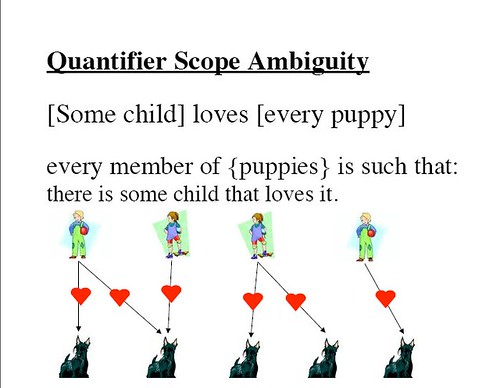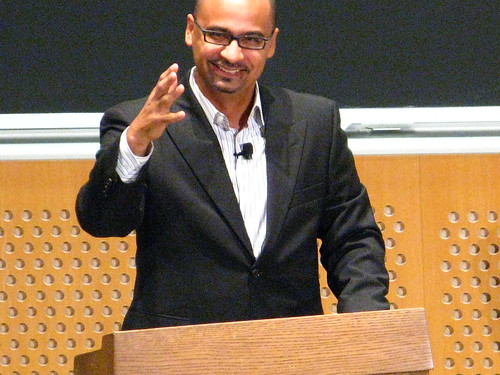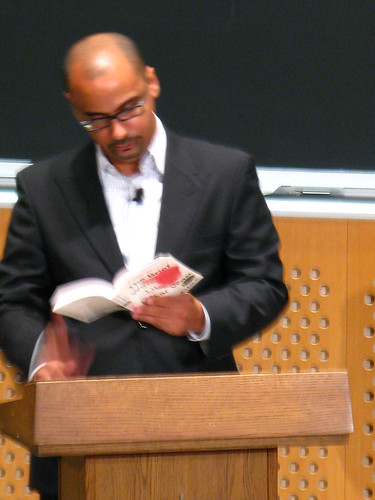A word about the humanities by Yan Z. '12
It's sort of a long, multi-section word.
On the Coming of Winter in Boston
November
peels away
like buttery sheathes
of apple-crisp,
sizzled brown skin
off a roasted turkey
that your grandmother
accidentally stuffed with snow
As you can see, the existence of the humanities at MIT is non-trivial. In fact, I have just proved this fact in such a way as to cause e.e. cummings to weep in his grave.
As an MIT student, I devote at minimum ten hours a week to thinking about the humanities, listening to lectures about the humanities, going to recitations about the humanities, writing papers about the humanities, eating lunch with the humanities, working on problem sets about the humanities, going to off-campus events about the humanities, and generally making sure that the humanities don’t unfriend me on Facebook. In my endeavors, I am greatly assisted by the MIT HASS (Humanities and Social Sciences) course requirements. By assisted, I mean something more like “forced to comply in order to graduate,” but let us not fret about semantics.
HASS, in a vague and deformed nutshell, is MIT’s method of making sure that students take at least one humanities/communication class per semester. As you may be able to surmise, I’m trying to avoid telling you anything specific about the HASS requirements because there is a 93% chance that I will say something that is completely imaginary, spurring a horde of upperclassmen blog commenters to descend like locusts upon a ripe orchard of false information. Anyway, the main point is that (1) thinking too much about the HASS requirements will erode your massive brainpower, which is why I don’t do it and instead just listen to my advisor when I have to pick classes, and (2) HASS is kind of awesome, even if the requirement descriptions are written like a psycholinguistics aptitude exam.
This semester, Paul B. and I both selected Introduction to Linguistics (24.900) as our HASS course. The workload involves:
2 five-page papers
Regular fieldwork with a native speaker of a foreign language (read: some random international student in your hall)
A midterm but no final
4 or 5 problem sets
A ten-page final paper
Laughing at Professor Norvin Richard’s jokes and/or beard and/or beard jokes
Realizing why the “and/or” construction is actually redundant but using it anyway
One of the reasons why 24.900 is an amazing course is that the problem set solutions can look like this. Keep in mind, I’m referring to a humanities class.

Also: Problem sets involve writing sentences that sound uber-loony when taken out of context.

Also: Lecture slides can legitimately remind you of the day you discovered Paint in Windows 95.

Interestingly, it seems that about half of the theories covered in 24.900 were written by MIT professor Noam Chomsky, whose Wikipedia page is about as long as that of Switzerland.
Speaking of famous writers at MIT, Pulitzer-Prize winning MIT professor Junot Diaz gave a reading of his Pulitzer-Prize winning novel The Brief Wondrous Life of Oscar Wao a few months ago in the non-Pulitzer-Prize winning Stata Center. After first hearing about The Brief Wondrous Life of Oscar Wao in the brief, wondrous blog of Matt McGann over the summer, I entered a long and fruitless cycle of (1) going to Borders, (2) intending to buy the novel, and (3) failing to reach the d-section of the alphabetized-by-last-name bookshelves without becoming irrevocably distracted. Blasted Truman Capote.
So I showed up to Diaz’s reading, regrettably bookless, and was magically endowed with a free copy of the novel, courtesy of MIT and FASAP. Elated, I flipped the cover . . .

And wondered why some literature-despising philistine had defaced the title page. That is, until I was told that Junot Diaz had personally autographed every last book.

(Trust me, it’s his signature. He won a Pulitzer for literature, not for autographing.)
It almost goes without saying that Junot Diaz was brilliantly witty, humble, and daringly honest, with hand gestures to prove it. I was inspired to go forth and fill the Internet with art, which is why you’re reading this right now.

Here, Junot Diaz does something that I have never done before. That is, read his book.

Luckily, I have a four-hour plane flight on Thursday, so I shall proceed to rescue myself from literary starvation as I feast on overpriced peanuts.
Frosh HASS = penchant for pedantic prose?
FIRST!
haha.
and I think that hass makes mit so much more well-rounded than people think it is.
and i love your writing style, yan!
“Pedantry can … be an indication of certain developmental disorders. In particular … high-functioning autism…. Those with Asperger’s tend to obsess over the minutiae of subjects and are prone to giving long detailed expositions, and the related corrections, and may gravitate to careers in academia or science where such obsessive attention to detail is often functional and rewarded.”
Wow, personally autographed!
I have to read that book sometime soon.
As soon as I have sometime to read it… :/
You are absolutely going to LOVE that book. It is one of my favorites.
Onward…
Are you allowed to take more than one hass class in one semester?
@Lin
You win. Superscript, first time ever.
That’s one of my favorite books EVER. I’m SO jealous you got to meet Junot Diaz!
You’re going to love the book. It’s great.
i love your sense of humor!!
@ eecominghere:
I’m so flattered.
Regarding the and/or business… it all depends on whether the or is an inclusive or OR an exclusive or. An inclusive or is the same thing as and/or, while an exclusive or means either/or.
The “OR” I used was exclusive, by the way.
Lin, you can take -only- HASS classes in one (or more) semester(s) if you so wish.
To elaborate, if your major is in a HASS Course (21 anything, etc.) (it happens!), you very well may have only HASS classes in your schedule for several semesters.
Reading that now for English class, it’s great so far!
Is and/or redundant? Or in english is usually parsed as XOR, therefore the and/or really means OR [or I suppose something like (AND) or (XOR)].
Yup.
Got to balance the life and thank you (us) all for the opportunity.
Great photos!
HASS classes are my life.
Fully 80% of my courseload right now falls under HASS. I think I’m going to finish the HASS requirement twice over by the time I graduate.
WOOO! I love MIT HASS…=D (probably because I’m not techy enough to do engineering…le sigh)
@ Another:
The gist is that “or” does not entail “either/or,” which means that in many cases “and/or” is actually redundant. For instance: Everyone who is a blogger OR reads the admissions blog is awesome. Clearly, someone who is a blogger AND reads the admissions blogs is also awesome. I’m living proof of this, naturally.
Here’s a trickier example:
“John isn’t afraid of anyone who is a student or under 19, but he’s afraid of everyone else.”
Is John afraid of anyone who is both a student and under 19? Why/why not?
“in possession of a piece of fruit”
Interesting.
Ooo, your blog entry makes me want to go out and get the book. I really want to read it now.
@Yan: The distinction between the logical operators xor and or in the English word ‘or’ is blurred frequently enough that I would make the argument it is just being polite to write ‘and/or’ to be clear. Especially when you’re writing something like rules or laws, you want to be absolutely sure that it is interpreted as or, not xor.
Ugh, are you saying that it is necessary to take a humanities course? Damnnn, why do people always force me to take courses involving writing, and lots of it. -_-
Linguistics, Noam Chomsky = Very very cool.
wow
Yan, one the topic of requirements, I have a question: Does 12.007 (geobiology) satisfy the biology GIR?
P.S. As always, you have such a fun-to-read writing style!
P.P.S. I find it amusing that “hass” is the stem of the German verb “to hate.”
Not that I don’t believe HASS classes at MIT are as wonderful as you describe them, I just think it’s a fun coincidence that a tech school chose that acronym for its humanities requirement.
I wept out of laughter.Thank you very much. I have not had a laugh for a while.
HAHuhaaaaaaaaaaaaaa
@ Reena:
Unfortunately, the GIR requirements are pretty restricting. You’ll either have to take 7.012 in the fall or 7.013/7.014 in the spring (unless MIT is offering computational biology as a GIR class next year, or something else that they don’t usually do).
Interesting fact about HASS. I always thought it was short for hassle, but I like the German spin on it.
Also, way to go on picking Course 12. My roommate and I, weirdly, both have parents who are geophysicists.
one word:
lmao
…except that’s cheating, since linguistics is a science.
>.>
HASS includes classes taken at Sloan?